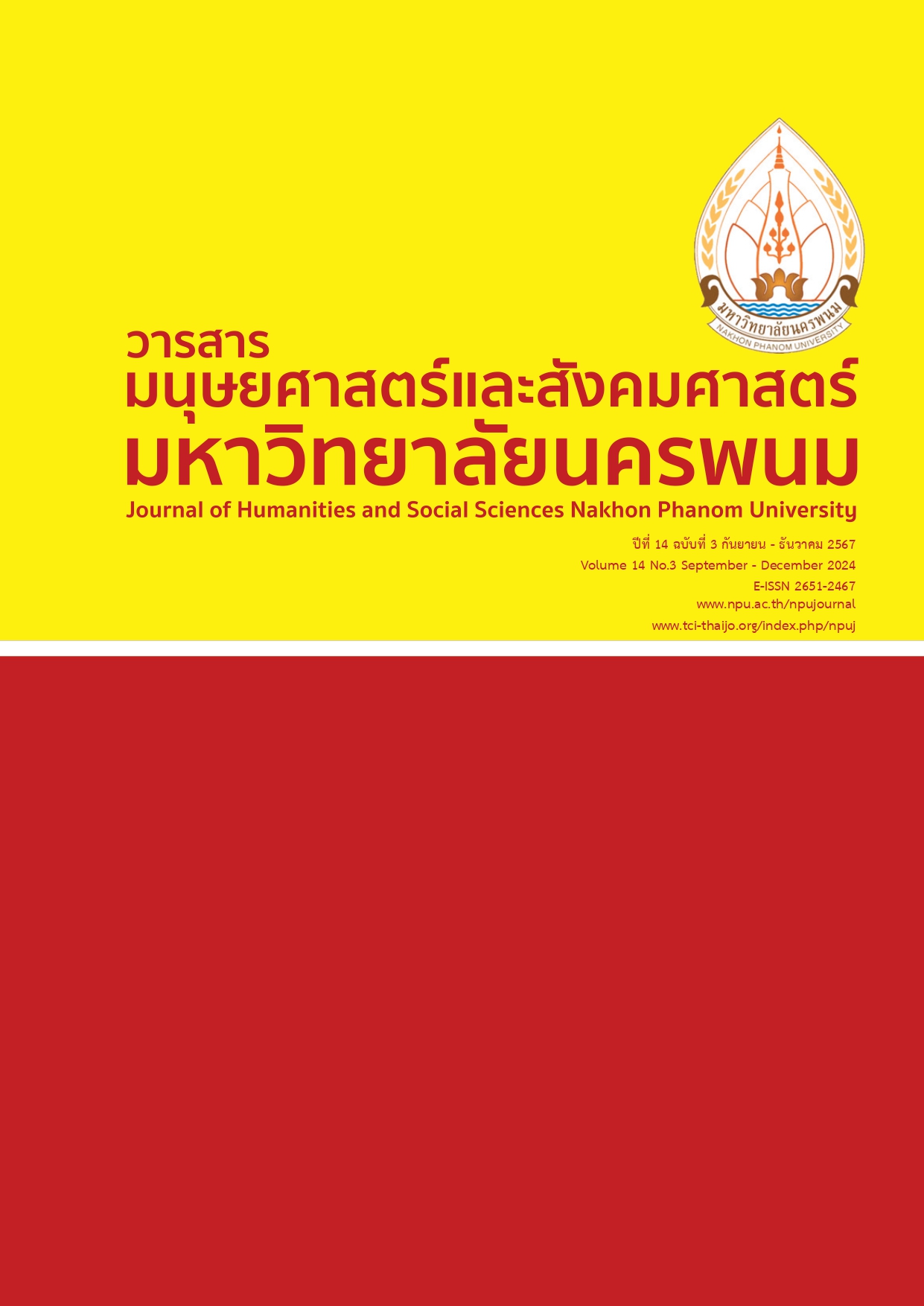Social and Emotional Skills for Tourism and Hospitality Industry Workers
Main Article Content
Abstract
This research aimed to study and identify the distinctive and necessary social and emotional skills for the tourism and hospitality industry staff. A mixed method with a parallel design approach between quantitative research and qualitative research was employed using questionnaires and interviews as data collection tools. The population included workers operating in the tourism and hospitality industries in the six Andaman provinces of Thailand. Data were collected from 400 workers using non-probability sampling by accidental selection methods and from 30 interviewees using the purposive sampling selection. Data were analyzed using descriptive statistics, content analysis, confirmatory factor analysis (CFA), and importance-performance analysis (IPA). Results revealed that 1) emotional intelligence, flexibility and adaptability, and customer service were the most important and necessary social and emotional skills for working in the industry, 2) social and emotional skills are specific to each job in the tourism and hospitality workers, which can be categorized into three groups, including primary skills, secondary skills, and auxiliary skills. The findings from this study will benefit human resource management and serve as an important knowledge for the development of manpower potential and desired characteristics of the tourism and hospitality industry staff.
Article Details

This work is licensed under a Creative Commons Attribution-NonCommercial-NoDerivatives 4.0 International License.
References
Anthonius, A. (2021). The Influence Of Employee Empowerment, Soft Skills And Hard Skills Towards Employee Performance In Hotel/Hospitality Industry. COMPETITIVE Jurnal Akuntansi dan Keuangan, 5(2),14-24.
Asbari, M., Purwanto, A., Ong, F., Mustikasiwi, A., Maesaroh, S., Mustofa, M., Hutagalung, D. & Andriyani, Y. (2020). Impact of Hard Skills, Soft Skills and Organizational Culture: Lecturer Innovation Competencies as Mediating. EduPsyCouns: Journal of Education, Psychology and Counseling, 2(1),101-121.
Asefer, A. & Abidin, Z. (2021). Soft skills and graduates’ employability in the 21st century from employers’ perspectives:A review of literature.International Journal of Infrastructure Research and Management, 9(2),44-59.
Bremer, K. F. & Maertens, S. U. (2021). Future skills of flight attendants in times of covid-19-related job uncertainty—the case of Germany. Administrative Sciences, 11(4), 154.
Carlisle, S., Ivanov, S. & Espeso-Molinero, P. (2023). Delivering the European Skills Agenda: the importance of social skills for a sustainable tourism and hospitality industry. Tourism & management studies, 19(3),23-40.
Chala, F. M. & Bouranta, N. (2021). Soft Skills Enhance Employee Contextual Performance: The Case of the Maritime Industry. KnE Social Sciences, 5(9),126–138.
Cochran, W. G. (1977). Sampling techniques (3 rd ed). New York : John Wiley & Sons.
Faizin, M., Isnaini, A., Sudarmiatin, S. & Firmansyah, R. (2024). Analysis Of Entrepreneurial Soft Skills In Improving MSME Business Sustainability In Pasuruan Mangrove Tourism Area. International Journal of Economics and Management Research, 3(1),103-116.
Goni, M. D., Naing, N. N., Hasan, H., Wan-Arfah, N., Deris, Z. Z., Arifin, W. N., Baaba, A. A. & Njaka, S. (2020). A confirmatory factor analysis of the knowledge, attitude and practice questionnaire towards prevention of respiratory tract infections during Hajj and Umrah. BMC public health, 20(1684),1-8.
Kenayathulla, H. B., Ahmad, N. A. & Idris, A. R. (2019). Gaps between competence and importance of employability skills: evidence from Malaysia. Higher Education Evaluation and Development, 13(2),97-112.
Kirschner, P. A. & Stoyanov, S. (2020). Educating youth for nonexistent/not yet existing professions. Educational Policy, 34(3),477-517.
Kiryakova-Dineva, T., Kyurova, V. & Chankova, Y. (2019). Soft skills for sustainable development in tourism: the Bulgarian experience. European Journal of Sustainable Development, 8(2),57-57. https://doi.org /10.14207/ejsd.2019.v8n2p57
Koc, E. & Boz, H. (2020). Development of hospitality and tourism employees’ emotional intelligence through developing their emotion recognition abilities. Journal of Hospitality Marketing & Management, 29(2),121-138.
Kumar, S. V. (2021). A study on adept soft skill & knowledge accompanying hospitality employee retention behavior during Covid-19 lockdown phase.Anais Brasileiros de Estudos Turísticos, 11,1-9. https://doi. org/10.5281/zenodo.5770073
Magalhães, C., Araújo, A. & Andrés Marques, I. (2023). Hotel workers’ perceptions on soft and hard skills in Porto, Portugal. Journal of Human Resources in Hospitality & Tourism, 22(1),49-70.
Mamatzakis, E., Pegkas, P. & Staikouras, C. (2023). Labour market regulations and efficiency in tourism industry. Tourism Economics, 29(4),1032-1054.
Pranić, L., Pivac, S. & Mandić, A. (2024). Soft skills’ infusion in tourism curricula: scale development and validation. Anatolia, 1-18. https://doi.org/10.1080/13032917.2024.2363804
Pranić, L., Pivčević, S. & Praničević, D. G. (2021). Top 30 soft skills in tourism and hospitality graduates: A systematic literature review. Tourism in Southern and Eastern Europe, 6,637-656. doi:10.20867/ tosee.06.43
Prentice, C., Dominique Lopes, S. & Wang, X. (2020). Emotional intelligence or artificial intelligence-an employee perspective. Journal of Hospitality Marketing & Management, 29(4),377-403. https:// doi.org/10.1080/19368623.2019.1647124
Rabiul, M. K., Promsivapallop, P., Al Karim, R., Islam, M. A. & Patwary, A. K. (2022). Fostering quality customer service during Covid-19: The role of managers’ oral language, employee work engagement, and employee resilience. Journal of Hospitality and Tourism Management, 53,50-60. https://doi.org/ 10.1016/j.jhtm.2022.09.002
Sharma, S. & Singh, V. (2020). Soft Skills in Tourism–A case study of Tourism Management Graduates. Retrieved December 2022, from https://www.ijrar.org/papers/IJRAR2001190.pdf
Singh, A. & Jaykumar, P. (2019). On the road to consensus: key soft skills required for youth employment in the service sector. Worldwide Hospitality and Tourism Themes, 11(1),10-24.
Sonnenschein, K. (2021). It’s Important for Us to Know How to Do Teamwork: Perceptions of Chinese International Hospitality Students Regarding Teamwork Skills. Journal of China Tourism Research, 17(2),309-322.
Swann, C., Rosenbaum, S., Lawrence, A., Vella, S. A., McEwan, D. & Ekkekakis, P. (2021). Updating goal-setting theory in physical activity promotion: a critical conceptual review. Health Psychology Review, 15(1),34-50.
Teng, H.-Y. (2019). Job crafting and customer service behaviors in the hospitality industry: Mediating effect of job passion. International journal of hospitality management, 81,34-42. https://doi.org/10.1016 /j.ijhm.2019.03.013
Weber, M., Lee, J. & Crawford, A. (2020). A suggested best practices for enhancing performance of soft skills with entry-level hospitality managers. Anatolia, 31(1),76-87.
Wetsanarat, N. (2021). Soft skill competency development to enhance competitiveness of Thai incentive travel industry. RICE Journal of Creative Entrepreneurship and Management, 2(1),53-65. doi:10. 14456/rjcm.2021.24
Zhu, D., Doan, T., Kanjanakan, P. & Kim, P. B. (2022). The impact of emotional intelligence on hospitality employees’ work outcomes: a systematic and meta-analytical review. Journal of Hospitality Marketing & Management, 31(3),326-347.


